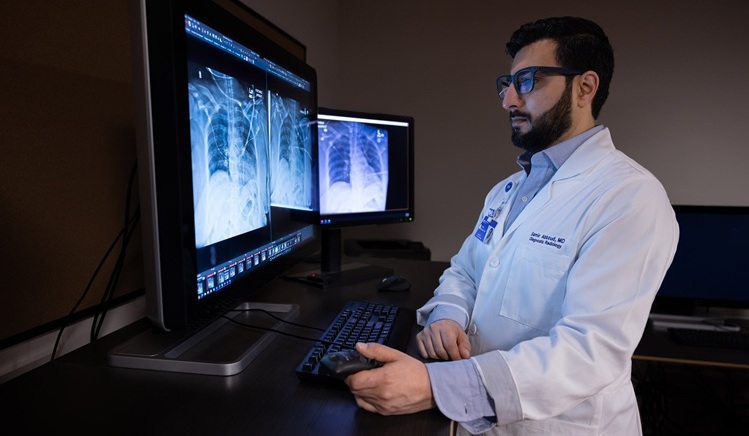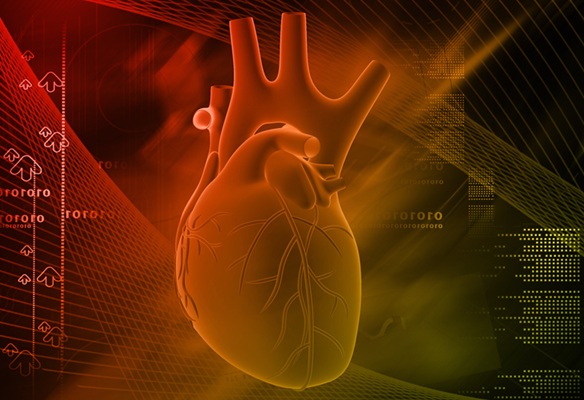Cloud-Based Service Converts DICOM Data to Realistic Models
|
By MedImaging International staff writers Posted on 26 Sep 2013 |
A new cloud-based, easy-to-use, cost-effective service allows medical professionals to rapidly create, view, share, and three-dimensional (3D)-print full-color 3D anatomic models directly from Digital Imaging and Communications in Medicine (DICOM) data.
Bespoke Modeling, developed by 3D Systems (Rock Hill, SC, USA), gives clinicians the ability to diagnose and communicate more effectively, simplify medical imaging, improve medical instruction, and it enables smoother patient referrals. Subscriptions to the cloud-based application start at USD 30 per month and deliver extraordinary access to advanced technology in a very easy-to-use way with immediate availability.
Bespoke Modeling makes it easy to view patient-specific 3D data, bookmark views, add annotations, explore specific anatomic structures, and then order color 3D-cloud printed models or print on-site. 3D-printed models can also be used in a teaching environment mimicking realistic, bone-like properties when sawed and drilled.
“The sensory feedback experienced using Bespoke Modeling 3D prints is nearly identical to operating on a real bone,” said Dr. Bernard Cannas, founder of Sapo Implant (Paris, France), a physician training company that tested Bespoke Modeling for its implantology courses. “We can now use many more models during our training course providing greater hands-on training than we ever could with cadaver bone.”
“We use 3D-printed models in our educational exercises whenever possible,” commented Dr. W. Paul Brown, a consulting associate professor at Stanford University (Stanford, CA, USA). “The ability to manipulate a 3D, digital anatomical model on a computer in Bespoke Modeling and at the same time hold and manipulate a 3D print of the same structure is a unique and useful teaching tool.”
Bespoke Modeling is compatible with prevalent web browsers, such as Microsoft Internet Explorer, Google Chrome, Apple, Safari, and Mozilla, Firefox. It is also available on iPad, iPhone, and Android devices.
3D Systems is a provider of 3D content-to-print solutions including 3D printers, print materials and on-demand custom parts services for professionals and consumers alike with materials ranging from thermoplastics, metals, ceramics and edible sugar. Its integrated solutions replace and complement conventional techniques and reduce the time and cost of designing new products by printing real parts directly from digital input. These systems are used to rapidly design, create, communicate, prototype or produce real parts, empowering customers to manufacture the future.
Related Links:
3D Systems
Bespoke Modeling, developed by 3D Systems (Rock Hill, SC, USA), gives clinicians the ability to diagnose and communicate more effectively, simplify medical imaging, improve medical instruction, and it enables smoother patient referrals. Subscriptions to the cloud-based application start at USD 30 per month and deliver extraordinary access to advanced technology in a very easy-to-use way with immediate availability.
Bespoke Modeling makes it easy to view patient-specific 3D data, bookmark views, add annotations, explore specific anatomic structures, and then order color 3D-cloud printed models or print on-site. 3D-printed models can also be used in a teaching environment mimicking realistic, bone-like properties when sawed and drilled.
“The sensory feedback experienced using Bespoke Modeling 3D prints is nearly identical to operating on a real bone,” said Dr. Bernard Cannas, founder of Sapo Implant (Paris, France), a physician training company that tested Bespoke Modeling for its implantology courses. “We can now use many more models during our training course providing greater hands-on training than we ever could with cadaver bone.”
“We use 3D-printed models in our educational exercises whenever possible,” commented Dr. W. Paul Brown, a consulting associate professor at Stanford University (Stanford, CA, USA). “The ability to manipulate a 3D, digital anatomical model on a computer in Bespoke Modeling and at the same time hold and manipulate a 3D print of the same structure is a unique and useful teaching tool.”
Bespoke Modeling is compatible with prevalent web browsers, such as Microsoft Internet Explorer, Google Chrome, Apple, Safari, and Mozilla, Firefox. It is also available on iPad, iPhone, and Android devices.
3D Systems is a provider of 3D content-to-print solutions including 3D printers, print materials and on-demand custom parts services for professionals and consumers alike with materials ranging from thermoplastics, metals, ceramics and edible sugar. Its integrated solutions replace and complement conventional techniques and reduce the time and cost of designing new products by printing real parts directly from digital input. These systems are used to rapidly design, create, communicate, prototype or produce real parts, empowering customers to manufacture the future.
Related Links:
3D Systems
Latest Imaging IT News
- New Google Cloud Medical Imaging Suite Makes Imaging Healthcare Data More Accessible
- Global AI in Medical Diagnostics Market to Be Driven by Demand for Image Recognition in Radiology
- AI-Based Mammography Triage Software Helps Dramatically Improve Interpretation Process
- Artificial Intelligence (AI) Program Accurately Predicts Lung Cancer Risk from CT Images
- Image Management Platform Streamlines Treatment Plans
- AI-Based Technology for Ultrasound Image Analysis Receives FDA Approval
- AI Technology for Detecting Breast Cancer Receives CE Mark Approval
- Digital Pathology Software Improves Workflow Efficiency
- Patient-Centric Portal Facilitates Direct Imaging Access
- New Workstation Supports Customer-Driven Imaging Workflow
Channels
Radiography
view channel
AI Radiology Tool Identifies Life-Threatening Conditions in Milliseconds
Radiology is emerging as one of healthcare’s most pressing bottlenecks. By 2033, the U.S. could face a shortage of up to 42,000 radiologists, even as imaging volumes grow by 5% annually.... Read more
Machine Learning Algorithm Identifies Cardiovascular Risk from Routine Bone Density Scans
A new study published in the Journal of Bone and Mineral Research reveals that an automated machine learning program can predict the risk of cardiovascular events and falls or fractures by analyzing bone... Read more
AI Improves Early Detection of Interval Breast Cancers
Interval breast cancers, which occur between routine screenings, are easier to treat when detected earlier. Early detection can reduce the need for aggressive treatments and improve the chances of better outcomes.... Read more
World's Largest Class Single Crystal Diamond Radiation Detector Opens New Possibilities for Diagnostic Imaging
Diamonds possess ideal physical properties for radiation detection, such as exceptional thermal and chemical stability along with a quick response time. Made of carbon with an atomic number of six, diamonds... Read moreMRI
view channel
New MRI Technique Reveals Hidden Heart Issues
Traditional exercise stress tests conducted within an MRI machine require patients to lie flat, a position that artificially improves heart function by increasing stroke volume due to gravity-driven blood... Read more
Shorter MRI Exam Effectively Detects Cancer in Dense Breasts
Women with extremely dense breasts face a higher risk of missed breast cancer diagnoses, as dense glandular and fibrous tissue can obscure tumors on mammograms. While breast MRI is recommended for supplemental... Read moreUltrasound
view channel
New Incision-Free Technique Halts Growth of Debilitating Brain Lesions
Cerebral cavernous malformations (CCMs), also known as cavernomas, are abnormal clusters of blood vessels that can grow in the brain, spinal cord, or other parts of the body. While most cases remain asymptomatic,... Read more.jpeg)
AI-Powered Lung Ultrasound Outperforms Human Experts in Tuberculosis Diagnosis
Despite global declines in tuberculosis (TB) rates in previous years, the incidence of TB rose by 4.6% from 2020 to 2023. Early screening and rapid diagnosis are essential elements of the World Health... Read moreNuclear Medicine
view channel
New Imaging Approach Could Reduce Need for Biopsies to Monitor Prostate Cancer
Prostate cancer is the second leading cause of cancer-related death among men in the United States. However, the majority of older men diagnosed with prostate cancer have slow-growing, low-risk forms of... Read more
Novel Radiolabeled Antibody Improves Diagnosis and Treatment of Solid Tumors
Interleukin-13 receptor α-2 (IL13Rα2) is a cell surface receptor commonly found in solid tumors such as glioblastoma, melanoma, and breast cancer. It is minimally expressed in normal tissues, making it... Read moreGeneral/Advanced Imaging
view channel
CT Colonography Beats Stool DNA Testing for Colon Cancer Screening
As colorectal cancer remains the second leading cause of cancer-related deaths worldwide, early detection through screening is vital to reduce advanced-stage treatments and associated costs.... Read more
First-Of-Its-Kind Wearable Device Offers Revolutionary Alternative to CT Scans
Currently, patients with conditions such as heart failure, pneumonia, or respiratory distress often require multiple imaging procedures that are intermittent, disruptive, and involve high levels of radiation.... Read more
AI-Based CT Scan Analysis Predicts Early-Stage Kidney Damage Due to Cancer Treatments
Radioligand therapy, a form of targeted nuclear medicine, has recently gained attention for its potential in treating specific types of tumors. However, one of the potential side effects of this therapy... Read moreIndustry News
view channel
GE HealthCare and NVIDIA Collaboration to Reimagine Diagnostic Imaging
GE HealthCare (Chicago, IL, USA) has entered into a collaboration with NVIDIA (Santa Clara, CA, USA), expanding the existing relationship between the two companies to focus on pioneering innovation in... Read more
Patient-Specific 3D-Printed Phantoms Transform CT Imaging
New research has highlighted how anatomically precise, patient-specific 3D-printed phantoms are proving to be scalable, cost-effective, and efficient tools in the development of new CT scan algorithms... Read more
Siemens and Sectra Collaborate on Enhancing Radiology Workflows
Siemens Healthineers (Forchheim, Germany) and Sectra (Linköping, Sweden) have entered into a collaboration aimed at enhancing radiologists' diagnostic capabilities and, in turn, improving patient care... Read more


















